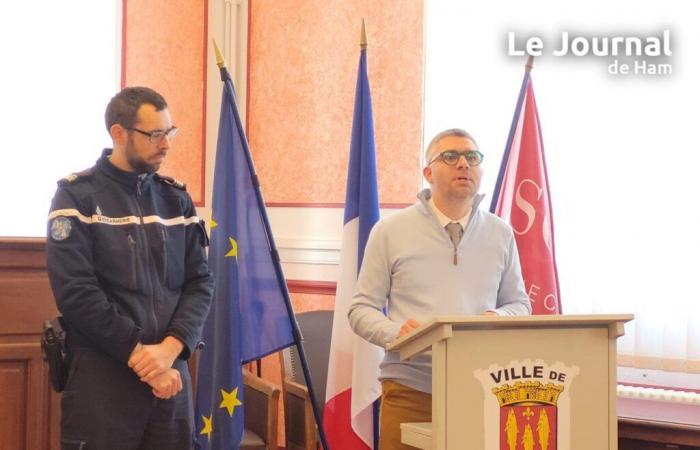“I persist and sign, we must, State and local authorities, fight against incivility and delinquency, but also organize preventive actions intended for all, without forgetting repressive operations, oh so essential too. Frédéric Demule, mayor of the town of Nesle, a commune of 2,308 inhabitants, signed the first security contract for the district of Péronne on Tuesday October 22, with the State (represented by Laurence Lecoustre, sub-prefect of Péronne) and the gendarmerie (with squadron leader Geoffroy Blin).
First security contract in the district
This security contract reinforces existing systems in the municipality of Nesle such as the “Small Towns of Tomorrow” agreement signed on 1is February 2021 and previously, in March 2020, the coordination agreement allowing collaboration between the gendarmerie and the municipal police.
The chief magistrate of the small town in the east of the Somme has not wavered and remains convinced of the major challenge represented by the security and tranquility of its inhabitants and beyond. Encounter.
Why did you sign this first security contract in the district?
Frédéric Demule: When the new commander of the Péronne company arrived, we met and discussed the various issues of the town of Nesle, including the “Small Towns of Tomorrow” system. The commander then told me that he was going to work on the security issue. I have to be honest: I call the commander at least 5 times a week. We receive acts of delinquency every week: Nesle is a quiet town. Nesle's delinquency rates are lower than those of towns with the same population strata. But there are scourges: drugs, speed and road crime, and intra-family violence. All this led us to formalize things by signing this security contract in order to put a diagnosis on paper and, behind it, to find solutions to respond to these problems.
“I ask for more controls on the municipality”
How will this translate into practice on the ground?
We must carry out the first diagnosis by the end of the year. There will be more prevention, particularly on intra-family violence through college, perhaps among women who are giving birth, we will also rely on associations… It also means taking advantage of existing moments to do prevention. We have big companies, why not take action in them. The idea is to have a snowball effect. For the narcotics aspect, it means doing more work on our young people from elementary school and college. For the topic of road crime, I ask that there be more controls in my municipality.
Can this convention evolve?
Yes, it can naturally evolve. Today, a girls' gendarmerie (like Nesle) is open two half-days a week. In 2023, I obtained the maintenance of the number of gendarmes (i.e. 8) with 10 municipalities and 3000 fewer inhabitants. At the start of the mandate, I obtained a third half day of opening and as part of this security contract, I obtained a fourth half day (finally, opening on Monday from 8 a.m. to 12 p.m., Wednesday from 8 a.m. to 12 p.m. and from 2 p.m. to 6 p.m. and Saturday from 8 a.m. to 12 p.m., editor's note), and will be on duty at the Nesle town hall on market day. There is also the fact of wanting to anticipate the construction site and the arrival of the Seine Nord Canal. There will be more workers and the site risks causing negative consequences such as theft and others. In terms of security, we cannot prepare for tomorrow with the same staff and the same actions as today. The security contract therefore also comes in anticipation of the Seine Nord Europe Canal.
No second municipal police officer yet
This contract evokes a greater partnership with the municipal police. How will this happen?
There already existed a coordination agreement signed by my predecessor, signed in March 2020. There are therefore joint operations. For example: joint control during the summer, speed checks (this summer, there were 8 or 9 operations)…
Is the municipal police officer armed? Do you plan to hire a second agent?
No, not for the moment, but a reflection should arise for the years to come with the construction site of the Seine Nord Europe Canal.
Is there not a risk of becoming “Big Brother” (reference taken from 1984 by George Orwell's.), between this contract and the increase in cameras?
There is strong demand from the population. The two topics that come up the most during my visits are the demand for housing and the feeling of insecurity. This feeling comes from the news channels and from everyday incivility: the dog that won't stop barking, the young person who passes by on a bike on the sidewalk… this represents delinquency by our elders. Cameras are a deterrent.
Twelve additional video surveillance cameras
You will go from 54 to 66 cameras. That seems like a lot for a town of 2,308 inhabitants. No?
I am attached to the tranquility of my constituents. It's still not enough for my taste. There will be additional cameras within two years, in addition to the 66, particularly at the solidarity center and the car parks. Safety first! They are distributed across the entrances to Nesle, throughout the town in public places, the square, crossroads… The 12 will be in the city center (rue Gambetta, rue du Couvent) and on various strategic crossroads… This was done in consultation with the gendarmerie.
What is the cost of video protection?
We are looking at maintenance costing around 3,800 euros for the 66 cameras, per year. The twelve additional cameras represent approximately 58,000 euros of investment including tax. We have a quality tool.
For you, would this be useful and necessary?
It's useful and necessary and, honestly, it's paying off. We saw it with the knife attack: 30 minutes later, we had all the elements. The stabbing took place at 10:20 p.m. At 11 p.m., all the elements were in the possession of the gendarmerie and we could see everything very clearly on the three cameras which filmed the scene. In less than 4 days, the author was arrested. Cameras are only used at the request of the gendarmerie and/or if residents lodge a complaint. There are only three people who are authorized to watch them. It's a real speed-up to solving the case. When there are thefts, delinquency and major gendarmerie operations, they serve. Everything is recorded for 30 days.
Do you do video verbalization?
No. We don't have permission.
Do you have a lot of requests from the gendarmerie to view the recordings?
At least once a week, but in the majority of cases, it's for small things like a car that crashed… When the police officer carries out checks and gives a fine for bad parking for example, I ask to get out the image to keep proof in case the person comes to complain. Another example, the cameras allowed us to find this summer young people who had twisted road signs, young people who broke trees on the ramparts… The same goes for a man who had walked into a pole that belonged to the municipality: we found him with the cameras.
“We do a lot for them”
Obviously, we see a lot of petty delinquency among young people. Why in your opinion?
They themselves don't know why they do it. It's the same in every city. The town of Nesle is doing enough for young people: we have a pump track, we have set up play areas, sports facilities, we carry out actions with the social life space, we offer sports tickets, there is still three associations that have been created… There is nothing that interests young people anymore except their phone. And yet, we did a lot for them.
Also read:
Somme: Reinforced sanctions against road insecurity since September 1
Somme: reinforced security in front of schools on this back-to-school day






